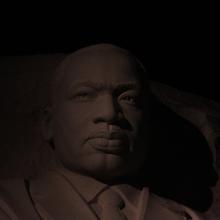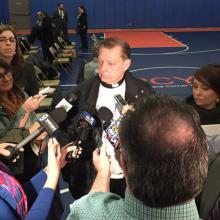Martin Luther King Jr.
King’s preaching used the power of language to interpret the gospel in the context of Black misery and Christian hope. He directed people to life-giving resources and spoke provocatively of a present and active divine interventionist who summons preachers to name reality in places where pain, oppression and neglect abound. In other words, King used a prophetic voice in his preaching — the hopeful voice that begins in prayer and attends to human tragedy.
YOU, FAITHFUL CHURCH workers, have survived the demands of Lent, Holy Week, Easter, and Pentecost, and I’m willing to wager you are tired. By this time in the liturgical cycle, I’m usually exhausted and my spiritual (and sometimes physical) walk includes a pronounced limp. Vocational and social demands have taken their toll, not to mention the profound collective trauma we have all been through. Two years ago this summer, the waves of direct action in response to the police killings of Breonna Taylor and George Floyd left many of us particularly drained. And the shootings have not stopped. We have all done and been through so much.
Throughout the New Testament, the text refers to faith using the Greek word pistis. That word can also translate as faithfulness, a dogged determination that refuses to acquiesce or let anyone stifle it. It’s the same faith exercised by the woman with the flow of blood and shown in the litany of ancestors in Hebrews 11. It is more than sentimental, and sometimes is best exercised by simply being still and remembering who God is.
Our scriptures this month encourage us to exercise and examine our faith so that we keep going forward, even if we must stop and reset ourselves. Whether our posture is active or passive, our faith is still called into action because the world needs our witness.
One of the best jobs I ever held was assistant manager at Grace Records. I was a founding staff member at the new and used vinyl shop in Arizona, a father and son venture that was a thrill to work at.
Interestingly, when I revisited a lot of Dr. King’s speeches and civil rights history, [I noticed that he] would often mention Beloved Community, but there wasn't like a singular speech where he completely unpacked what the Beloved Community means. And so in one sense, it was almost like it was assumed that a lot of people understood what the concept meant, or maybe he was hoping that people would kind of fill in [the gaps] with their own values and priorities. And so I feel there is a need to recast the vision for the Beloved Community in more contemporary terms.
Rustin, who died in 1987, is best known for helping Rev. Martin Luther King Jr. implement Gandhian tactics of nonviolence and for the key role he played organizing the 1963 March on Washington and the Southern Christian Leadership Conference — two key components of the civil rights movement.
Less well-known are the particularities of Rustin's faith, including his deep roots in the Quaker and African Methodist Episcopal churches which drove his activism. Those two faith traditions, marked by silence and singing, respectively, echoed throughout Rustin’s life and work.
Confession is telling the truth. Telling the truth to God and the world about ourselves. Jesus says, “You will know the truth, and the truth will set you free.” Confession leads to freedom. This day is about freedom for all of us. Without confession to the sin of white racism, white supremacy, white privilege, people who call themselves white Christians will never be free — free from the bondage of a lie, a myth, an ideology, and an idol.
I understand you’ve been to the White House with active and retired sanitation workers and met President Obama.
It was awesome. We men were invited to the [Map Room] and we went in, talked with the president, shook his hand. He said, “I want to thank you gentlemen for your efforts and your hard work.” He said, “Because if it hadn’t been for you all, I wouldn’t be standing here where I am today.” He said, “I’m standing on y’all’s shoulders.”

By Adam Jones, Ph.D. (Own work) [CC BY-SA 3.0], via Wikimedia Commons
Some chose to push back against injustice. Others tried to protect the status quo. Many thought they could just be spectators, watching without getting involved. That’s not possible, then or now.
Deaf white ears, children. Deaf white ears. That's what we have. Freedom is freedom for all or it's simply not freedom and Jesus still hangs on that cross today just as truly as he did all those years ago.
With the blessing of Pope Francis, Cardinal Blase Cupich on April 4 unveiled an anti-violence initiative for this beleaguered city that will be underscored by a Good Friday procession, using the traditional stations of Jesus’ way to the cross to commemorate those who have lost their lives in street violence.
Cupich said he was inviting civic, education, and religious leaders, and “all people of good will,” to take part in the April 14 “Peace Walk” through the heart of the violence-scarred Englewood neighborhood.
On Jan. 21, I’ll join thousands in D.C. for the Women’s March on Washington. My first stop will be at a local congregation, one of several hosting a prayer service and warming station for marchers. I’m an anti-racist, feminist, Christian, and for me, faith will be part of the day.
I’ve been disappointed with Christian silence, and even active resistance, to social justice imperatives, but my commitments to justice stem from my faith, and that’s why I march.
Imagine receiving this message on your voicemail: “Dear Mr. Gonzalez, we regret to inform you that your heart surgery has been canceled. The medical professionals scheduled to perform it, Doctors Sarna and Latif, have discovered that they have serious disagreements about Middle East politics. Consequently, they are refusing to work together. We will do our best to find you other doctors, before your condition becomes fatal.”
Seem far-fetched? In my mind, it is the logical outcome of the manner in which many Jewish and Muslim groups have chosen to engage each other in recent years. Or, rather, not engage.
Some of my friends have been talking about giving up the “evangelical” label, because of what it has come to be associated with, in this year’s political campaign. I’m not ready to make that move. I spent a good part of the 1960s trying hard not to be an evangelical, but without success.
When I marched for civil rights during my graduate school years, I helped to organize “ban the bomb” marches and protested the Vietnam War. I was clearly out of step with much of the evangelicalism of the day.
In an interview conducted on Nov. 7, on the eve of the election, and published Friday by an Italian daily, the Argentine pope declined to make any judgment about Trump.
“I do not judge people or politicians,” the pope told Eugenio Scalfari of La Repubblica when asked what he thought of Trump. “I only want to understand what suffering their behavior causes to the poor and the excluded.”
This semester I’m teaching a course called “Faith and Politics” at Emory University’s Candler School of Theology. It’s been a fascinating class for me, and I’m blessed to have very bright students who are required to volunteer for an actual political campaign and keep a journal of their experience.
Their final assignment is to write a paper proposing strategies for healing our divided nation. Our assumption is that all of the major faith traditions have important resources to bring to conflict transformation and reconciling opponents.
There are a few lessons from my class that might be useful for politicians and for the entire nation as we move toward the election.

Ebenezer Baptist Church in Atlanta. L. Kragt Bakker / Shutterstock.com
I believe pulpits are supposed to change communities and nations — and history. They are supposed to raise up preachers and their congregations to stand and speak and act for biblical justice. I have been very blessed on this tour for my new book, America’s Original Sin: Racism, White Privilege, and the Bridge to a New America, by preaching and being in many of those pulpits that are changing things yet again.

Photo via Atomazul / Shutterstock
Although King should rightly be lifted up as a hero of nonviolence and deeply Christian minister, we need to be reminded of King's radical legacy. King harshly criticized white people who failed to support black leadership. And particuarly toward the end of his life, King began to speak out about economic injustice and militarism, decrying the ills of capitalism and the Vietnam War.
As you remember today a leader who was murdered for his political beliefs, take a moment to reflect on these nine quotes:

Edmund Pettus Bridge in Selma, Ala. James R. Martin / Shutterstock.com
We live in a culture that not only glorifies violence, but often celebrates its use against the “enemy" as the truest form of heroism and bravery. While I won’t get into the debate of whether violence is ever justified to preserve life (a much bigger conversation extending far beyond an 700-word post), I will say I’m deeply troubled by our assumption that violence is the only way to respond to a real or perceived threat.
Today’s radical black Christians may not line up with our nation’s romanticized image of Martin Luther King Jr.
In an Op-Ed over at NBCBLK, Brooke Obie discusses how many of the radical leaders at the forefront of the Black Lives Matter movement draw on deep Christian wells to inspire their activism, but express that faith very differently than the old heroes of the 1960s.
State Sen. Sylvia Allen, R-Ariz., wins the top prize for this year’s silliest religious idea so far.
While debating a proposed law that would permit people to carry concealed weapons in public buildings, Allen said, “Probably we should be debating a bill requiring every American to attend a church of their choice on Sunday to see if we can get back to having a moral rebirth.”
Although the senator said it was a “flippant” suggestion, she remained unapologetic for her comments on “the moral erosion of the soul of America.”















